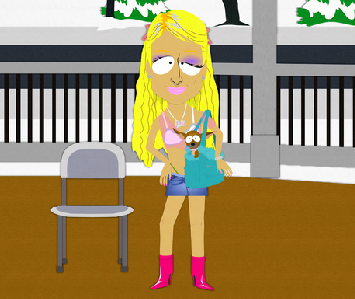Everyone Probably Owes Paris Hilton An Apology
by Mike Barthel

We were watching the Paris Hilton episode of “South Park” the other night, in which the Paris character repeatedly coughs up semen and causes her dog to shoot itself. (She also dresses Butters in a bear costume, but never mind.) I remember it being funny and righteous at the time-2004-or at least not all that different from other things going on in the media. The episode is entitled “Stupid Spoiled Whore Video Playset,” and that about summed up the national mood.
Watching it today, though, it looked… well, it looked kind of mean.
I know, I know: why in the world should we have any sympathy for Paris Hilton? After all, she seemed to come through it fine, and is still just being Paris. Thing is, though, at the time all of this hit, she was a 22-year-old girl going out and getting drunk and doing drugs and sleeping around-which, unless you are lame, is exactly what you were doing when you were 22. The problem with Paris wasn’t Paris, it was the amount of attention the media paid to Paris. (Assuming you think Paris Hilton is a less worthy subject of attention than a Hollywood starlet, which seems questionable to me, but again, never mind.) And whether or not she encouraged the attention, the simple fact is that if you had a problem with the media, the target of your complaints should be the media.
But that’s not what we did. As in the “South Park” episode, the person we complained about was Paris. Now, I wouldn’t particularly want to be friends with Paris, and I am certainly a little peeved that she became this weird monkey’s paw of fame who, by simple friendship, could ruin the lives of singers and actors who might have otherwise made it out OK. But, again, neither her behavior nor her existence were particularly abnormal: licentious youth and trust-fund kids have had a robust presence in American society for some time. So why did we all feel OK saying just these incredibly awful, mean things about her? The whole discourse around Paris took on a real Christians-in-the-Colosseum feel. But shit, who cares?
Well, we did. The thing about Paris Hilton is that she embodied a lot of the important social issues of the 00s, like the glorification of affluence, celebrity culture as entertainment and the direction of feminism. Talking about her was a way of talking about these things without having to feel like we were having a real, serious discussion-something that, in America, we avoid at all costs. Pop culture is great for having these proxy wars because it provides a stable, common object of analysis, something we all know about that can serve as a jumping-off point for debates about shared values.
The problem is that when it’s a real person, these debates have implications for other real people. The message sent by scarlet-lettering a real person’s real actions as an affront to our collective values was that engaging in behaviors which the more liberal amongst us would describe as “having fun” was something you should (still!) be ashamed of. Sure, go ahead and do it-after all, the consumer economy relies on young people “going crazy” in this way-but for God’s sake, be quiet about it.
The message of the “South Park” episode was that girls shouldn’t use sluttiness (though note the word “whore” in the episode’s title) as a way of getting ahead. But that’s not what Paris did. She got ahead just by being born. As part of a general trend of glorifying marriage-based paths to success-see also “My Super Sweet 16” and most of the “Real Housewives”-Paris served as a legitimate focal point of debate.
But that’s not really what people had a problem with. It was the things Paris did to have fun, like sleeping around and getting wasted. Certainly these are not always good activities, but they’re not inherently bad either. I thought we had all agreed on that!
Ultimately, I’m not asking for anyone to have sympathy for Paris Hilton. It’s more that I’m reminding myself, I suppose, to keep this in mind the next time a moral panic hits. Think of the children! Elaborate condemnation of the stupid and privileged feels good, I know. But there’s always collateral damage. There are lots of awful people in the world, and while I endorse the entertainment value of following their lives, maybe let’s save the public flagellation for people who are actively causing other people harm. Lord knows there’s no shortage of them.
Mike Barthel has written about pop music for a bunch of places, mostly Idolator and Flagpole, and is currently doing so for the Portland Mercury and Color magazine. He continues to have a Tumblr and be a grad student in Seattle.
